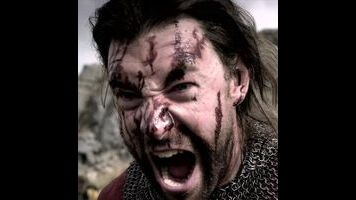
Kurt Sutter may lack restraint, in terms of both his storytelling and the Twitter invective he unleashes on those who don’t cotton to it, but he has no shortage of ambition. If Sutter’s new historical epic The Bastard Executioner is any indication, he wants to be known for more than his heavy, Shakespeare-lite biker gang show Sons Of Anarchy or his reputation as cable drama’s enfant terrible. He wants to take his place among the upper echelon of contemporary television dramatists, and he’ll have earned it if he manages to set Executioner apart from its genre peers. If nothing else, making a show that begs comparison to Game Of Thrones and Braveheart establishes Sutter as television’s ballsiest showrunner, even as Executioner proves he isn’t its best.
Executioner stars Lee Jones as the terrifically named Wilkin Brattle, a war-weary Welsh knight living, like the rest of his countrymen, under the draconian rule of King Edward III in one of Wales’ overtaxed fiefdoms. Once the history of the early 14th-century period is laid out in an elaborate textual prologue, Executioner finds Brattle struggling to carry the moral weight of a life spent disemboweling foes on the battlefield. After an ethereal vision convinces him to lay down his sword, Brattle resolves to focus on a simpler life alongside his wife Petra (Elen Rhys) in their typically quaint farming village. Of course, Brattle can’t retire without one last big score—a massive assault on the oppressive tax collector that yields unintended consequences, as violent uprisings so often do.
After the kingdom brings the battle to Brattle’s doorstep, killing a cherished family member in the process, his bloodlust is awakened, propelling him on a campaign of righteous revenge. Executioner initially seemed like Sutter was veering off-brand, but the show’s many thematic parallels with Sons Of Anarchy will make it a comfortable place to land for Anarchy fans in mourning. Like Anarchy’s tragic hero Jackson Teller (Charlie Hunnam), Brattle means to escape from the brutal environment he was steeped in. But living the life of a warrior knight, especially for a virtuosic swordsman like Brattle, means racking up karmic debts that can only be paid with the suffering of his loved ones. Just when he thought he was out, they pull’d him backeth in.
Brattle takes up his sword yet again, reinventing himself as a journeyman executioner in order to infiltrate the evil empire, take his revenge, and topple the oppressive regime from the inside. Assisting Brattle in his journey is Annora Of The Alders (Katey Sagal), a wizened mystic healer as powerful in the dark arts as Gemma Teller-Morrow, Sagal’s character on Anarchy, and equally murky motives. It’s a clear-enough narrative, and director Paris Barclay, Sutter’s long-time collaborator, has a knack for making a dirty, dour environment look tidy and approachable. But the pilot and second episode, which FX has packaged as a back-to-back premiere, feels like an interminable slog.
Executioner will certainly sate viewers with a hunger for violence. From its earliest moments, the show is packed with airborne viscera and sanguine geysers, reinforcing Sutter’s reputation as a storyteller capable of delving into unbelievably violent worlds without flinching. The problem with Sutter’s ultra-violent approach is that, in a post-Red Wedding world, viewers quickly acclimate to non-stop brutality. The third episode, which begins to take on the momentum not seen in the two-hour premiere, features one of 2015’s most repugnant scenes of television violence. It’s the kind of material that would quickly become unwatchable without emotionally detaching from it, and there’s a major disconnect when, after only three episodes, the audience is unfazed by the horrific actions that fill Brattle with dread.
That said, the third episode begins to show promise as Brattle begins learning his new environment and sizing up the evil baron (Brian F. O’Byrne) and his potentially redeemable baroness Lowry (Flora Spencer-Longhurst), who attempts to rule even as her loyalties are torn between the warring territories. The episode is also the best platform for Stephen Moyer, who seems to be having the most fun as Milus Corbett, the baron’s unyielding right-hand. By the end of the third installment, Executioner has begun to find a rhythm, or at least demonstrate what its episodic storytelling looks like.
But getting there requires committing to a two-hour pilot that shouldn’t be nearly as dull as it is given the amount of blood spilled. Unlike Thrones, which offers multiple paths into the story through sheer overpopulation, Executioner requires an investment in Brattle and his quest for vengeance. Jones is appealing enough, and excels at communicating Brattle’s world-weariness, but his downtrodden expressions may too often mirror those of the audience. To riff on Tina Turner, we don’t need another anti-hero. But for those viewers with room in their lives for a character like Brattle and a show like Executioner, they could do worse. But not far worse.